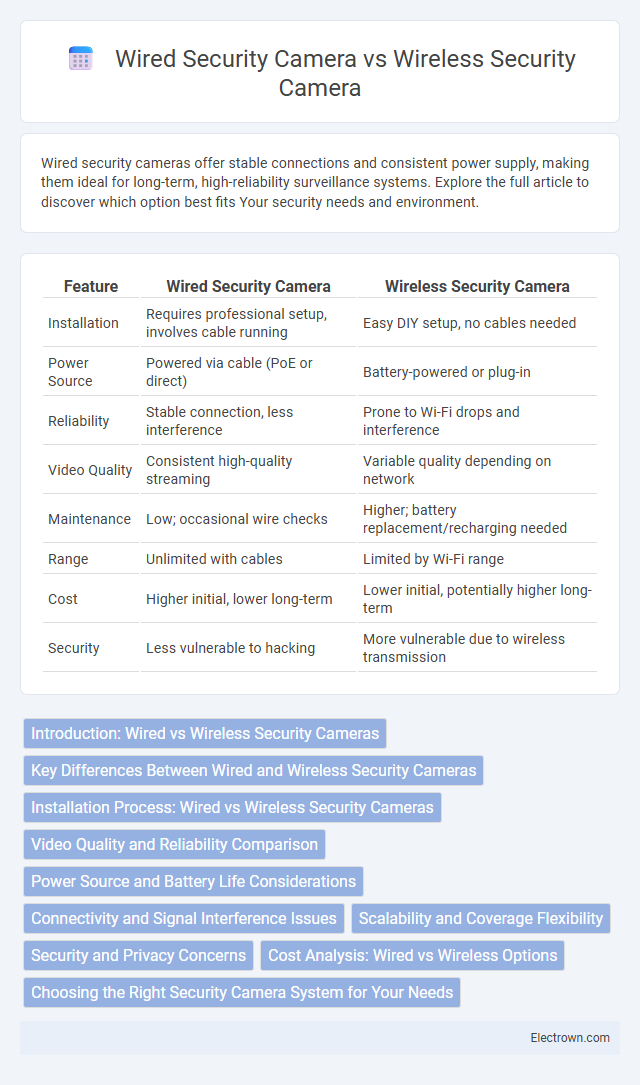Wired security cameras offer stable connections and consistent power supply, making them ideal for long-term, high-reliability surveillance systems. Explore the full article to discover which option best fits Your security needs and environment.
Table of Comparison
| Feature | Wired Security Camera | Wireless Security Camera |
|---|---|---|
| Installation | Requires professional setup, involves cable running | Easy DIY setup, no cables needed |
| Power Source | Powered via cable (PoE or direct) | Battery-powered or plug-in |
| Reliability | Stable connection, less interference | Prone to Wi-Fi drops and interference |
| Video Quality | Consistent high-quality streaming | Variable quality depending on network |
| Maintenance | Low; occasional wire checks | Higher; battery replacement/recharging needed |
| Range | Unlimited with cables | Limited by Wi-Fi range |
| Cost | Higher initial, lower long-term | Lower initial, potentially higher long-term |
| Security | Less vulnerable to hacking | More vulnerable due to wireless transmission |
Introduction: Wired vs Wireless Security Cameras
Wired security cameras offer a stable connection and consistent power supply, often preferred for permanent installations with high-definition video quality. Wireless security cameras provide flexibility in placement and ease of installation, using Wi-Fi or battery power to monitor your property without extensive cabling. Your choice depends on factors like coverage area, installation complexity, and desired video resolution for effective surveillance.
Key Differences Between Wired and Wireless Security Cameras
Wired security cameras provide a stable connection through Ethernet or coaxial cables, ensuring consistent video quality and uninterrupted power supply, making them ideal for high-security areas with fixed setups. Wireless security cameras offer flexibility and ease of installation by transmitting footage over Wi-Fi, allowing placement in remote or difficult-to-wire locations but may face signal interference and require regular battery changes. Key differences include installation complexity, signal reliability, power sources, and potential vulnerabilities to hacking or physical damage.
Installation Process: Wired vs Wireless Security Cameras
Wired security cameras require a more complex installation process involving running cables through walls or ceilings, which can be time-consuming and may necessitate professional assistance. Wireless security cameras offer a simpler installation, relying on Wi-Fi connectivity and battery power, allowing for flexible placement and quick setup without extensive wiring. Choosing between wired and wireless depends on factors like location, network stability, and the need for a permanent or portable surveillance solution.
Video Quality and Reliability Comparison
Wired security cameras generally offer superior video quality due to stable, high-bandwidth connections supporting higher resolution footage without compression loss. Wireless security cameras provide flexibility and ease of installation but can suffer from interference, signal drops, and limited video clarity based on Wi-Fi strength. Your choice depends on prioritizing consistent reliability and sharp video detail with wired systems versus convenience and mobility with wireless setups.
Power Source and Battery Life Considerations
Wired security cameras rely on direct electrical connections, providing continuous power without the need for battery replacements or recharging, which ensures consistent operation ideal for long-term surveillance. Wireless security cameras operate using batteries, offering flexible installation locations but requiring regular monitoring and maintenance to recharge or replace batteries, which can impact reliability in critical security situations. Battery life varies significantly depending on usage, with some wireless models offering weeks to months of operation on a single charge, while high-resolution or advanced feature usage can shorten this duration substantially.
Connectivity and Signal Interference Issues
Wired security cameras offer stable, uninterrupted connectivity by using physical cables, minimizing the risk of signal interference commonly caused by walls, electronic devices, and distance in wireless systems. Wireless security cameras rely on Wi-Fi or radio frequency signals, making them vulnerable to connectivity drops and interference from other wireless networks or household appliances. For environments with dense signal obstacles or high network traffic, wired cameras provide more consistent performance and reliability.
Scalability and Coverage Flexibility
Wired security cameras offer reliable scalability for large installations but require extensive cabling, limiting coverage flexibility and increasing setup complexity. Wireless security cameras provide superior coverage flexibility with easy repositioning and expansion, ideal for dynamic environments or multiple monitoring zones. Both systems can be integrated with advanced network setups, yet wireless solutions often excel in adaptability for scalable home security systems.
Security and Privacy Concerns
Wired security cameras offer enhanced security and privacy by reducing risks of hacking due to their direct physical connections, minimizing vulnerability to wireless signal interception. Wireless security cameras, while more flexible and easier to install, can be exposed to cyberattacks if proper encryption and secure network protocols are not implemented. Choosing the right camera involves assessing your security needs, as wired options provide greater data protection, but wireless models require vigilant management of Wi-Fi security to safeguard your surveillance footage.
Cost Analysis: Wired vs Wireless Options
Wired security cameras typically involve higher upfront costs due to expensive wiring installation and professional labor, but they offer consistent power supply and reduced interference, minimizing long-term maintenance expenses. Wireless security cameras generally have lower initial setup costs and offer easy installation flexibility but may incur ongoing costs for battery replacements and potential signal issues. Evaluating total cost of ownership over time requires considering factors like installation complexity, power source reliability, and maintenance frequency for each option.
Choosing the Right Security Camera System for Your Needs
Wired security cameras provide consistent power and reliable connections, making them ideal for locations with fixed setups and minimal interference concerns. Wireless security cameras offer greater flexibility, easy installation, and remote access through Wi-Fi, perfect for users needing mobility or less invasive monitoring solutions. Evaluate your property layout, connectivity options, and monitoring preferences to determine whether a wired or wireless security camera system best suits your specific security needs.
Wired Security Camera vs Wireless Security Camera Infographic

 electrown.com
electrown.com